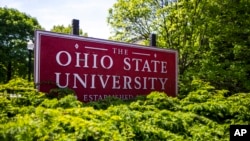Student Union
Schools Ask Students to Sign COVID Waivers

Colleges and universities are asking students and others to sign liability waivers against potential COVID-19-related lawsuits, according to recent news reports.
The Ohio State University football program asked players to sign waivers when returning to campus for voluntary workouts two weeks ago, writes the Columbus Dispatch, which broke the story.
While waivers have been a part of school sports and travel for decades, the subject got more attention after the Trump campaign required attendees of a rally in Tulsa, Oklahoma, on June 20 to sign COVID-19 waivers. The attendees were asked to agree to not sue the campaign or event organizers in case they were exposed to the coronavirus.
Rep. Mark Pocan, D-Wis., introduced the RALLIES act (the Refusal to Accept Losses or Liability In Every Situation Act) in the U.S. Congress on June 18 to prevent liability waivers from being enforced for indoor gatherings of 1,000 or more people, according to his website.
“We refuse to let a candidate for reelection threaten the lives of the people of this country for political gain,” Pocan stated. “With over 2 million COVID cases in the United States and over 116,000 deaths, I would hope this president’s actions would prioritize recovery, not a resurgence in cases nationwide.”
“This is coercive. I would not sign or advise anyone to sign it. Institutions must protect the HEALTH, safety and welfare of its students as athletes. Schools can’t opt-out by forcing kids to sign or not participate. Insure and ensure protection or don’t play!” a former National Basketball Association (NBA) player Len Elmore tweeted.
Not everyone agrees.
The father of Ohio State Buckeyes football player Gee Scott Jr. says he is “fine with it,” adding that Scott is safer “there than he is here with me.”
“At my home:
- housekeeper doesn’t come everyday
- There’s not a trainer at house
- there’s not a doctor there
- now after workouts he’s inside with his teammate,” he tweeted.
“Everybody takes these risks leaving their home everyday. We signed the same for our 8 year old. COVID exposure is impossible to prevent, so schools have their player acknowledge that. It is standard,” Twitter user @CRamsey_4 wrote.
Sen. Sherrod Brown, D-Ohio, said universities should do their best to keep everyone safe “without hamstringing workers or students’ ability to have a day in court if they don’t.”
“Colleges and universities should be doing everything in their power to keep everyone safe, including listening to scientists and public health experts as they consider resuming activities and repopulating campus,” he told The Hill news website.
Brown is also pressing to extend the amount of time workers have to file complaints against those actors who put workers’ health and safety at risk, according to a news release from his office.
“[W]orkers and consumers need protections from corporations, not the other way around. And that’s even more true during this pandemic, when millions of Americans are risking their health and safety to go to work. We’ve heard disturbing, widespread reports of unsafe workplaces leading to preventable illnesses and deaths. We should be making it easier – not harder – to hold corporations accountable to keep workers safe,” said Brown.
Sarmat Misikov contributed to this report.
See all News Updates of the Day
- By VOA News
Competition grows for international students eyeing Yale

It’s tough to gain admission to Yale University, and it’s getting even tougher for international students as standout students from around the world set their sights on Yale.
The Yale Dale News, the campus newspaper, takes a look at the situation here.
- By VOA News
Student from Ethiopia says Whitman College culture made it easy to settle in

Ruth Chane, a computer science major from Ethiopia, writes about her experiences settling into student life at Whitman College in the U.S. state of Washington.
"The community at Whitman College made sure I felt welcomed even before I stepped foot on campus," she says.
- By VOA News
Claremont Colleges student gets a shock when she heads home to Shanghai

In The Student Life, the student newspaper for the Claremont Colleges, a consortium of five liberal art colleges and two graduate schools in Claremont, California, student Rochelle Lu writes about readjusting to her Shanghai home after spending a semester in the United States.
- By VOA News
Cedarville University aims to ease transition for international students

Cedarville University in the U.S. state of Ohio says it’s got more than 140 international students representing 44 countries.
Here, the school interviews Jonathan Sutton, director of international student services. He talks about his job and the opportunities for international students on campus.
- By VOA News
Morehouse College offers prospective students tips on applying and thriving

Morehouse College, a private, historically Black liberal arts college in the U.S. state of Georgia, offers a guide for international students interested in attending the school.
Among the tips to apply and thrive at Morehouse:
- Take advantage of the school’s orientation program
- Turn to the school’s Center for Academic Success for tutoring, support and more
- Immerse yourself in campus life via clubs and societies






